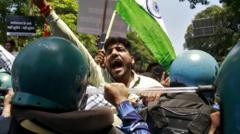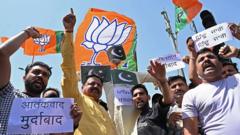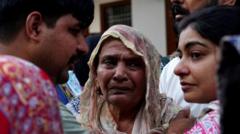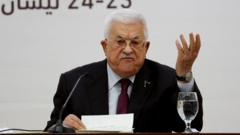Following an attack in Kashmir that left 26 tourists dead, Pakistan has suspended visas for Indians, expelled diplomats, and closed airspace to Indian flights. Both nations have issued severe diplomatic responses, with accusations flying and safety concerns rising for Kashmiri students in India.
Escalating Tensions: Pakistan Issues Visa Ban to Indians Following Kashmir Attack

Escalating Tensions: Pakistan Issues Visa Ban to Indians Following Kashmir Attack
In the wake of a deadly militant assault on tourists in Kashmir, Pakistan has suspended visas for Indian nationals and escalated diplomatic measures, prompting heightened tensions between the two nations.
In a swift reaction to heightened tensions, Pakistan has announced the immediate suspension of visas for Indian nationals following a brutal militant attack in Kashmir that resulted in 26 tourist fatalities. The assault, which occurred near the Pahalgam resort in the contested Himalayan region, has fueled a fiery exchange of diplomatic hostilities between the two neighboring countries.
In addition to halting visa services under an exemption scheme for Indian citizens, Pakistan has expelled some Indian diplomats and closed its airspace to all Indian-operated flights. Islamabad has firmly denied Indian allegations linking the Pahalgam attack to Pakistan, despite Indian police identifying three suspects connected to the terrorist group Lashkar-e-Taiba (LeT).
Responding to the tragedy, Indian Prime Minister Narendra Modi has vowed to track down the terrorists behind the attack. In a powerful speech, he warned that the consequences for the culprits would be far more severe than they could imagine, declaring that "terrorists will not break the spirit of India."
As part of its diplomatic retaliation, India has announced the closure of the Attari-Wagah border and also canceled visa services for Pakistani nationals. The escalating tensions have led to Pakistan rejecting India's suspension of the Indus Water Treaty, emphasizing that any disruption of water supply would be perceived as an act of war.
Following the attack, nearly 1,500 individuals have been detained in Kashmir as police investigate. Meanwhile, shops and schools are gradually reopening, though fear and paranoia linger in the region. Victims’ families are mourning deeply, as body repatriations occur across India amidst emotional farewells.
In a concerning trend, reports have surfaced of Kashmiri students facing harassment throughout India following the attack, exacerbating the atmosphere of fear and division. Instances of threats directed toward Muslim students from Kashmir have been recorded, prompting calls for vigilance and support within various communities.




















